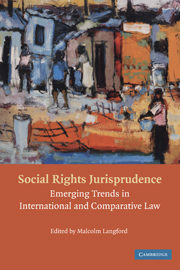Book contents
- Frontmatter
- Contents
- Foreword – Philip Alston
- Preface
- PART ONE OVERVIEW
- PART TWO SELECT NATIONAL JURISDICTIONS
- 4 South Africa
- 5 India
- 6 South Asia
- 7 Colombia
- 8 Argentina
- 9 Brazil
- 10 Venezuela
- 11 Canada
- 12 The United States
- 13 Hungary
- 14 France
- 15 United Kingdom
- 16 Ireland
- PART THREE REGIONAL PROCEDURES AND JURISPRUDENCE
- PART FOUR INTERNATIONAL HUMAN RIGHTS PROCEDURES AND JURISPRUDENCE
- PART FIVE SPECIAL TOPICS
- Notes on Contributors
- Table of Authorities
- Index
- References
5 - India
The Expectations and Challenges of Judicial Enforcement of Social Rights
Published online by Cambridge University Press: 05 June 2012
- Frontmatter
- Contents
- Foreword – Philip Alston
- Preface
- PART ONE OVERVIEW
- PART TWO SELECT NATIONAL JURISDICTIONS
- 4 South Africa
- 5 India
- 6 South Asia
- 7 Colombia
- 8 Argentina
- 9 Brazil
- 10 Venezuela
- 11 Canada
- 12 The United States
- 13 Hungary
- 14 France
- 15 United Kingdom
- 16 Ireland
- PART THREE REGIONAL PROCEDURES AND JURISPRUDENCE
- PART FOUR INTERNATIONAL HUMAN RIGHTS PROCEDURES AND JURISPRUDENCE
- PART FIVE SPECIAL TOPICS
- Notes on Contributors
- Table of Authorities
- Index
- References
Summary
INTRODUCTION
A discussion on the Indian jurisprudence in the area of economic and social rights has to begin with the Constitution. The Indian legal system is complex: Inherited from the colonial and common law model, the formal legal system is based on a written constitution, in effect since 1950. The Constitution delineates the enforceable fundamental rights and the non-enforceable Directive Principles of State Policy (DPSP) as well as the powers and obligations of the State. A significant feature of the Constitution of India is the principle of checks and balances by which every organ of state is controlled by and is accountable to the Constitution and the rule of law. The validity of the decisions of the Government can be challenged in the Supreme Court or the High Courts and writs of mandamus are available to enforce the State's obligations. Also, the laws made by the legislature can be struck down by these courts, if found contrary to the provisions of the Constitution. In addition, there are a number of statutes, both at the federal and provincial (state) levels that touch upon various aspects of economic, social and cultural rights.
These broad powers of constitutional review, combined with far-reaching legislation, have proved critical in the judicial enforcement of economic, social and cultural rights, which has produced a vast body of case law in the Supreme Court and the High Courts.
- Type
- Chapter
- Information
- Social Rights JurisprudenceEmerging Trends in International and Comparative Law, pp. 102 - 124Publisher: Cambridge University PressPrint publication year: 2009
References
- 2
- Cited by



